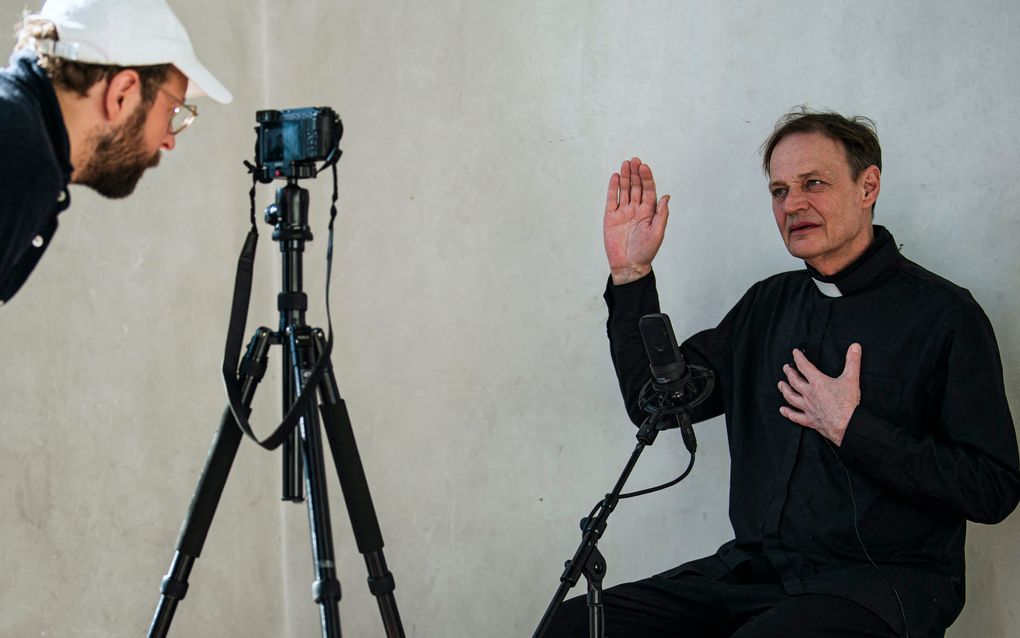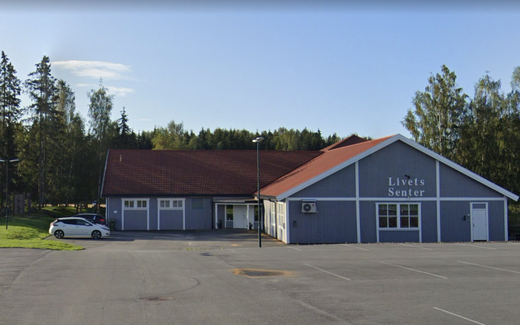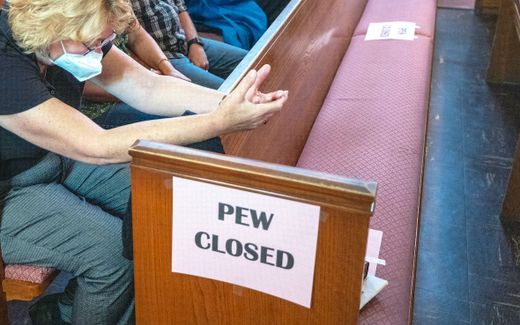Weekly column: Spiritual food during lockdown comes via Zoom
03-12-2021
Christian Life
Martins Martinsons, CNE.news

Churches have gone digital during the corona pandemic. Photo AFP, Jonathan Nackstrand
Christian Life
81-year-old Irene was sitting in front of her computer. She was gripped with anxiety. Her very first Zoom Bible study was waiting for the start. And that was a huge step.
Her church had organised this technical solution during the national lockdown in Latvia in October and November. Her relatives helped her to set up a Zoom account. On the previous day, a younger church member visited her to check if everything worked. She was nervous but ready to spend some time in God’s Word and pray with fellow believers.
70-year-old Janis went to the Sunday church service only to discover that the building was locked. At the door, he saw a printed note from the pastor. Due to the lockdown restrictions, the services would not take place, and people were encouraged to watch pre-recorded messages — no further comments.
Martins Martinsons (1982) works in Riga as a pastor of Pārdaugava Reformed church. This community started in 2016 as a small church plant.

Martins is married to Anda, and they are raising three children. In his spare time, he loves studying history, long hikes or camping with family and friends.
Well, I have changed the names of this sister and brother. But the two stories are real. Both examples reveal something about the life of elderly Christians during the current Covid situation.
No gatherings or meetings allowed
The strict lockdown means that no gatherings or meetings are allowed. Only the essential shops and services are opened. We are encouraged not to visit each other unless there is an emergency. And even then, visitors should not come from more than two different households. Besides all this there is an evening curfew from 20:00 hours, so everyone must stay home.
That means no church on Sundays, or, for that matter, any other day of the week. No services, no Bible studies, no prayer meetings. Correction: you can attend your church for 15 minutes at a time for an individual meeting with your pastor or priest. But these meetings need to be pre-arranged. No spontaneous visits.
And that, of course, presents a pressing challenge to us as Latvian Christians – how to continue to receive the needed spiritual nourishment and maintain relationships with other believers?
All churches went digital
I will never forget that social media were flooded with church live streams when the Covid crisis hit Latvia in 2020. On the live streams were services, pre-recorded talks, Bible studies, podcasts, and articles from virtually every church in Latvia.
There has never been a time with so many digital resources to pick from. And people have been using them, sharing them, and talking about them as their spiritual food. Since the beginning of the pandemic, the number of subscriptions to the material uploaded on YouTube by some churches has doubled and even tripled. These are not official statistics, just my personal observations.
And yet we could ask, is that sufficient?
On the one hand, we could say that this is much more than people had in the pre-internet-YouTube-Facebook era. Think of the restrictions and limitations people suffered during the pandemic of the Spanish Flu about hundred years ago. They didn’t have this luxury when their churches were closed due to safety measures.
On the other hand, how does the amount of online material help those Christians who simply don’t use, can’t use or don’t know how to use modern technologies? Of course, we live in the age of digital technology. But not everyone has access to it or knows how to use it. So, it would be fair to say that there are many for whom the “online church” is a real challenge. And believe me, these are not only the elderly.
Hospitality culture matters
Back to Irene and Janis: How can they continue receiving the spiritual nourishment necessary for their growth and Christian faith? The longer the restrictions remain, the more acute the question becomes.
Irene attends a relatively small local church. The leaders and the members there have been cultivating a culture of hospitality. They see the importance of taking care of each other, also outside the regular church gatherings. I must say, now this attitude is paying its dividends: people call each other, take walks together (just make sure you are back home by 20:00 hours), and stay connected. This is not ideal, but it seems to be working. No one is left outside the boat, as the saying goes.
On the other hand, Janis attends a church in a rural area. In fact, his pastor oversees several smaller congregations in a wider area. The church life has been built around regular meetings on Sundays and other weekly gatherings. Now, because these structures are not available, some people feel lost.
The work must go on creatively
These are just two examples that sit on the opposite sides of the spectrum. Many church leaders try to do their best to “feed the sheep” – both young and old. Christians are thinking of creative ways to continue “building up each other”. But it is not easy, not simple. Mistakes are made. And, yes, sadly, some people lose connection with the church.
Irene joined her local church just a few weeks before this lockdown started. But on that dreaded Zoom day, her prayer expressed gratitude for the church where she is accepted and where she can sit under the teaching of God’s word.
Related Articles






